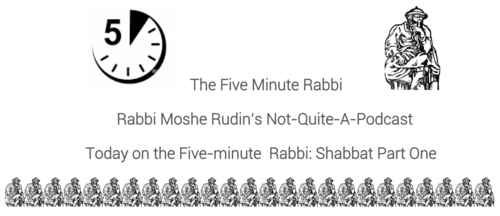The Five Minute Rabbi
05/31/2023 09:29:47 AM

Don’t read this- listen to it right here!
The Torah says (Exodus, parshat Mishpatim): Six Days you shall labor and perform all of your work - and the seventh day, Shabbat, a day of rest for Adonai Eloheicha - Adonai your G-d. Let’s take a short look at one of the greatest contributions if not the greatest of the Jewish people to civilization: ladies and gentlemen: we, Am Yisrael, give you… the weekend. Otherwise known as Shabbat.
The nineteenth century Jewish writer Achad HaAm said that, more than the people Israel has preserved Shabbat, Shabbat has preserved the people Israel. Shabbat is defined both by what it is and what it isn’t. What we do, and what we don’t do That’s one of the reasons we light two Shabbat candles: one represents the Torah’s Mitzvah: Shamor - keep the Sabbath as a day of sacred rest by not engaging in regular activities and Zachor - remember the Sabbath as a day of sacred action by doing activities that nourish us spiritually.
Today, we will cover Shabbat prohibitions - the stuff we don’t do.
Shamor - Keep the Shabbat: for one day, the Torah says, stop Let the world be. Take a breath, appreciate. For six days, we schlep, we strive, we struggle to master the world… for one day, enjoy. Don’t engage in work. Leave off from buying and selling, from travel and harvesting- leave the lawn mowing for another day. Don’t engage in making and breaking and fixing and doing. No cooking, no cleaning, no vacuuming, no sweeping.. Don’t kindle flames - neither the candle kind nor the flames of anger.
The Rabbis took all this seriously and enumerated 39 main creative acts and thousands of ancillary acts to refrain from: from harvesting to building to writing to tearing and sewing, sorting - anything that makes a permanent change in the world.
This even extends to carrying between private and public domains since almost all work involves schlepping something from one place to another. So anything to be used on Shabbat has to be brought into the home or synagogue before shabbat. Lay down the burden, says Shabbat, lift your eyes upward and be free.
Orthodox Jews don’t turn on electricity on Shabbat since they hold that this constitutes or derives from generating power which they consider a form of burning. Conservative Jews generally take a more lenient approach to electricity and mostly permit its use unless by doing so you are performing work. In other words, turning on a light to see is one thing - but firing up your electric weed wacker or turning on an electric stove is something else since these actions violate Shabbat.
What do these laws have to do with spirituality? One of my teachers told me that one of the longest books of the Talmud is Tractate Shabbat which contains all of these laws and more in nearly granular detail - it might sound picayune and absurd, he told me, until you realize this: all of the prohibitions serve one overarching purpose: for twenty four hours, one night and one day a week, you put everything else away and for that time you are completely there for the people who love you: you are there for your spouse, your children, your parents, friends and relatives, and you’re there for yourself- a day of letting the world be. If it takes a list of rules to ensure that happens- well, it’s worth it a million times over. And maybe connecting with your family, your community, yourself - maybe that’s what it means to connect with G-d. Shabbat Shalom
In our next two minute Rabbi installment we’ll talk about the way that Conservative Jews look at these rules and the big Matzah Ball of apparent contradiction to Conservative Jewish observance: Driving on Shabbat. In the meantime, if you can set aside even some time this coming Shabbat to relinquish, simplify, connect- then what a blessing! Thanks for tuning in-
